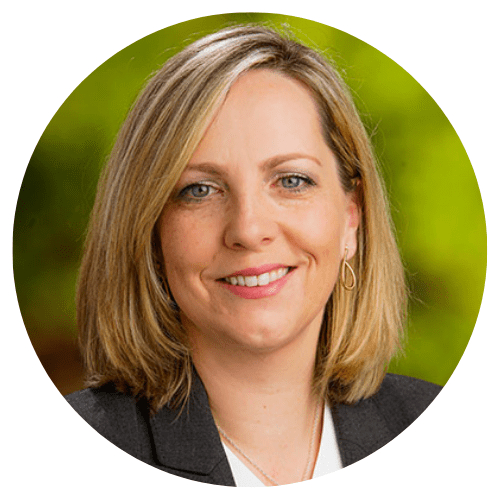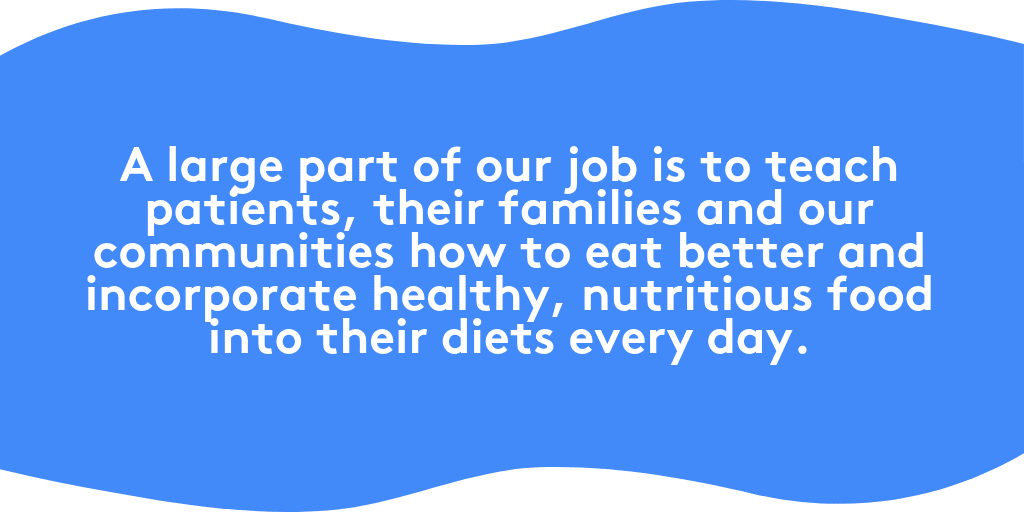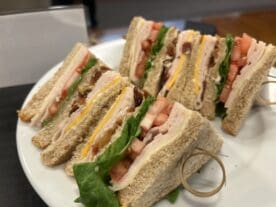A Q&A with Peggy O’Neill, VP of Nutrition and Wellness at Morrison Healthcare
Q. Tell us a little about your career and your commitment to nutrition and wellness.
Peggy: I was a clinical dietitian for people in long-term care for six years before going into management, where I worked my way into leading dietitians and developing nutrition support programs. Seven years ago, I started with Morrison as our Vice President of Nutrition and Wellness. In my current role, I manage clinical nutrition, wellness and sustainability, our internship programs and operations support. It’s a fun role. There is so much to do and so much to learn! 
Q. Talk to us about the Morrison Healthcare Wellness Department. What do they do?
Peggy: They manage and help develop wellness and sustainability programs for our clients (hospitals and healthcare systems). Many of our clients want to be wellness focused and promote sustainability, our team can help them do that through our programs. Our department also helps national and global organizations increase their focus on wellness and sustainability too. Often this looks like guiding them to make pledges or goals toward these types of commitments.
Q. National Nutrition Month was held back in March. What’s the focus of National Nutrition Month?
Peggy: National Nutrition Month is a way for us to educate people about how nutrition can be part of a healthy lifestyle and disease prevention. Most of our dietitians work in an acute care facility and deal with patients that are ill. A large part of our job is to teach patients, their families and our communities how to eat better and incorporate healthy, nutritious food into their diets every day.

Q. What do RDNs bring to the table and how do they contribute to the success of our company and our clients?
Peggy: Dietitians play a very significant role. We’re a contract foodservice company. So we are hired to provide food to patients, hospital associates, and guests. But the dietitians have a unique role, and it’s complementary to what our Culinary and Retail teams do.
RDNs really help patients understand the role food and nutrition plays in their health. We have face-to-face interaction with the patients, especially those that are most clinically ill. We see them while they’re hospitalized and on their way out. We help hospitals be successful by ensuring patients understand how they should eat, so they can manage their conditions and avoid being re-admitted to the hospital. Food and nutrition play an important role in their health and we help them understand that.

Q. Food and nutrition have become a huge talking point as it relates to our health. Many people are beginning to see food as medicine – talk about how that relates to ourdietitiansembodiment of the Power of Food?
Peggy: The Power of Food is a powerful statement and it relates to patients and the people we serve on so many levels. Our dietitians live by the Power of Food by helping patients, doctors and nurses understand how to better manage their patients’ conditions through food and nutrition. The Power of Food then, in the RDN’s case, is harnessing food’s power to prevent disease progression, combat illness and make informed food and nutrition decisions.
Q. Tell us how Morrison Healthcare RDNs are combatting malnutrition.
Peggy: Malnutrition is a huge issue in healthcare, so our Clinical Nutrition team has developed a malnutrition initiative that we are rolling out to hospitals.
Malnutrition is commonly considered a problem for people in third-world countries where people are underfed. But in the US, it affects people with chronic conditions. Many people are already suffering before arriving at the hospital. They’re not eating well or their medication isn’t allowing them to absorb food properly. Approximately 60 percent of patients admitted to a hospital have a mild or severe form of malnutrition.

Our initiative starts at admission. We help identify at risk patients, or ones that already have malnutrition and together with the physicians and coders (people who code diseases as part of a patient’s record), implement a program to provide a malnutrition diagnosis and intervention.
It’s so important to have that partnership between the physicians and coders. In fact, it has ramifications from a reimbursement standpoint. If malnutrition is coded in a patient’s record properly, the hospital will be reimbursed at a higher level by the federal government for Medicare patients. Those patients, then receive better care and can stay in the hospital for treatment longer.
Join the Morrison Healthcare Family
Looking for meaningful work helping people? Do you want to marry your passions and serving others? Check out available team member or management opportunities to join the Compass One Healthcare and Morrison Healthcare family. We believe in the Power of Food to change lives and are proud of the opportunities we have each day to help people and serve alongside world-class clients.
Morrison is a proud part of Compass One Healthcare and Compass Group USA.


